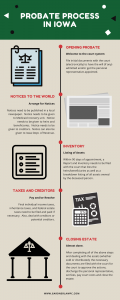Probate is the legal process of administering the estate of a deceased person. In Iowa, the person responsible for administering the probate is the executor or administrator of the estate. This individual is appointed by the court and has several important responsibilities, including:
- Collecting and preserving the assets of the estate: The executor or administrator must locate and gather all of the assets of the deceased person, including property, bank accounts, and other financial assets. They are also responsible for preserving these assets and ensuring that they are not wasted or misused.
- Paying debts and taxes: The executor or administrator is responsible for paying off any debts that the deceased person had at the time of their death, as well as any taxes that are owed. This includes funeral expenses, medical bills, and mortgages, among others.
- Notifying creditors and other interested parties: The executor or administrator must notify all creditors of the deceased person and provide them with an opportunity to make claims against the estate. They must also notify other interested parties, such as beneficiaries, and provide them with information about the estate.
- Filing court documents: The executor or administrator is responsible for filing all of the necessary court documents to open the probate and to obtain the court’s approval of the distribution of the assets.
- Distributing assets to beneficiaries: Once all debts and taxes have been paid, the executor or administrator is responsible for distributing the remaining assets of the estate to the beneficiaries.
It’s important to note that the Executor or Administrator may also have a fiduciary duty to act in the best interest of the estate and its beneficiaries. An Executor or Administrator who mismanages or steals from the estate may be held liable for their actions.
Administering an Iowa probate can be a complex and time-consuming process. It is important for the executor or administrator to be organized and to have a thorough understanding of the laws and procedures involved. They may also benefit from seeking the advice of an attorney to ensure that they are fulfilling their responsibilities correctly. (I know one or two that could help out.)

 What comes as a surprise to many people, a Will does not need to be notarized to be a valid document. It just
What comes as a surprise to many people, a Will does not need to be notarized to be a valid document. It just